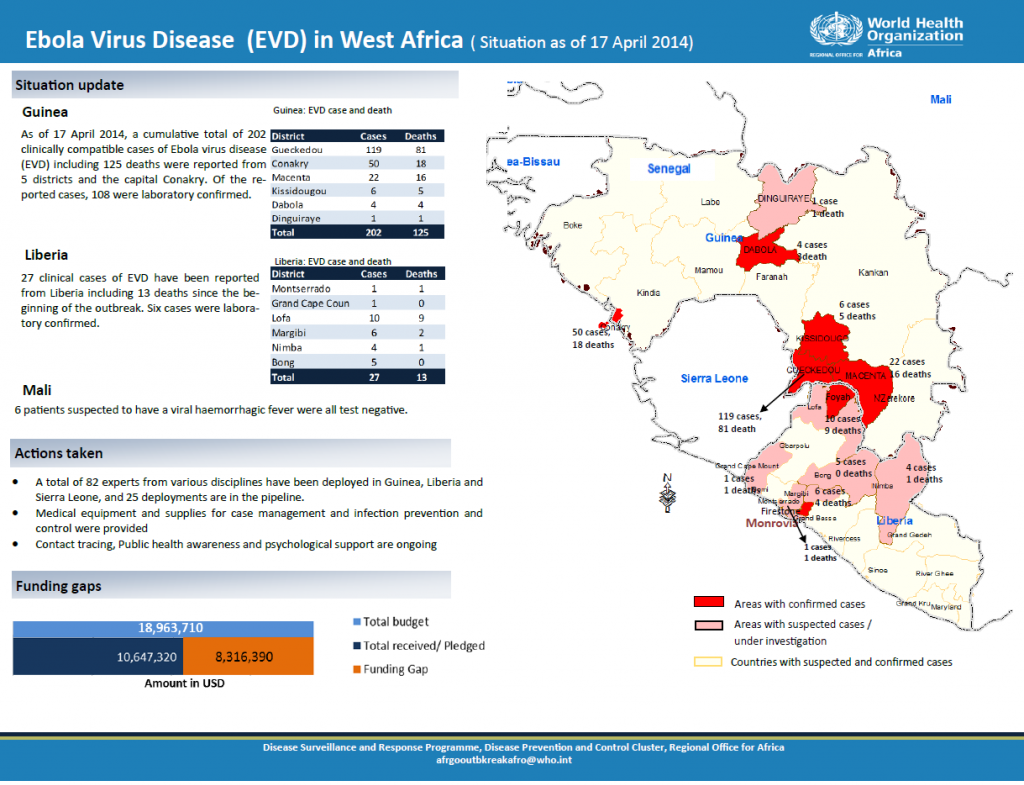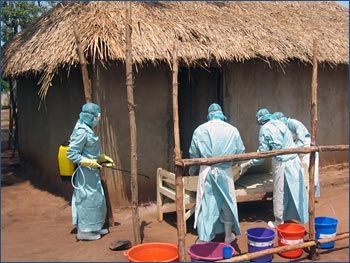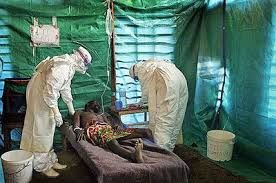
The United Nation's World Health Organization released new figures today for the death toll from Ebola spreading in Guinea, Mali, and Liberia today. These numbers may not look substantially higher than those from last week. The explanation is than last week Guinea reduced its count by half. Also Reuters reported a senior Guinea health official reporting that they will no longer issue death tolls to avoid causing unnecessary panic in the populations.
We can see from the reports of 50 cases and 20 deaths in Guinea's capital city of Conakry which are four times the last numbers I reported for Conakry, the "outbreak is still spreading. I've collected a number of articles to bring you up to date.
Ebola Outbreak Death Toll in West Africa Over 140
The World Health Organization says the current Ebola outbreak in West Africa has killed more than 140 people.
In a statement on its website Tuesday, the U.N. health agency said at least 230 suspected or confirmed cases of Ebola have been recorded so far in Guinea and Liberia. Most of the cases are in Guinea.
The statement said 129 deaths in Guinea and 13 in Liberia have been linked to the disease.

WHO latest update: Ebola epidemic situation get worse in Guinea
The Ebola epidemic in Guinea has worsened with each day adding numbers to the disease which has one of the highest morbidity among tropical infectious diseases. WHO has released its latest Ebola Virus Update and has said that 203 new cases of the deadly disease have been identified in the West African nation.
The disease has already killed 129 people 158 persons have tested positive for the Ebola virus infection. 109 cases have been confirmed in a laboratory. This also included 61 deaths.
The province wise statistics of the EVD is as follows-
Conakry 50 cases, including 20 deaths,
Guekedou 120 cases, including 83 deaths
Macenta 22 cases, including 16 deaths
Kissidougou 6 cases, including 5 deaths
Dabola 4 cases, including 4 deaths
And Djingaraye 1 cases, including 1 death
Laboratory confirmed cases and deaths are as follows-
Conakry 36 cases, including 15 deaths
Guekedou 58 cases, including 34 deaths
Macenta 13 cases, including 10 deaths
Kissidougou 1 cases, including 1 death
Dabola 1 cases, including 1 death
The figures also include 4 new cases which has been isolated on 17th April. 230 people are under observation and 53 have successfully completed the 21 days follow up. 7 subjects diagnosed with the disease have been quarantined as a precautionary measure. The virus has affected 24 health care workers too.
One bit of good news is that Liberia may have managed to contain the outbreak there with no reports of new cases. According to Liberia's Ministry of Health and Social Welfare Liberia has had 6 confirmed cases with two deaths.
The report of 50 cases in Conakry with 15 deaths is somewhat disturbing as this is substantially higher than previous reports. Conakry is Guinea's capital city with a population of over 2 million, many without running water, sewers, and poor public health infrastructure.

Reuters reports that the West African Ebola outbreak caused by new strain of disease: study, and not the Zaire strain imported from Central Africa as previously reported.
Because the new Guinea strain is genetically 97% similar to the Zaire strain, which is the deadliest of the five previously known strains of the Ebola virus, EBOV, scientists say the virus was not imported from Central Africa, but has probably been indigenous to the region, and has just not been noticed before. In sparely populated areas, an outbreak of Ebola will often "burn out" on its own, after killing everyone in a village or remote region. Then it resides in a reservoir animals, such as bats, which are not vulnerable to Ebola. until another transmission to humans, often for as long as a decade, based on limited detection since the 1970's when it was first detected.
"This study demonstrates the emergence of a new EBOV strain in Guinea," wrote the group of more than 30 doctors and scientists, who published their preliminary findings on the website of the New England Journal of Medicine.
"It is possible that EBOV has circulated undetected in this region for some time. The emergence of the virus in Guinea highlights the risk of EBOV outbreaks in the whole West African sub-region," the report continued.
Of the 197 clinical cases of Ebola declared in Guinea, 122 have died including several health workers, according to the World Health Organisation's latest update, which cited Guinean health ministry figures. Sixteen of those died in the capital Conakry.
A government spokesmen, presumable from Guinea told Reuters it will no longer issue death tolls to avoid causing panic.

Additionally, Liberia is reported to have had 13 deaths from 26 confirmed and suspected cases. The cases reported earlier for Mali and Sierra Leone now appear to be some other viral hemorrhagic disease, many of which are indigenous to the region.
Last week, the World Health Organization predicted the epidemic would last for another 2 to 4 months, which may be optimistic and is based on the presumption that new cases of animal to human infection are not occurring because populations have stopped eating potentially infected bush meat such as primates, bats, gazelles, and antelopes, and also populations will cease all risky contacts with potentially infected people from now one, or at least very quickly.
The fact that symptoms can take from 2 to 21 days from infection makes this challenging. The Ebola virus is spread from bodily fluids including blood, semen, sweat, spit, or objects contaminated by an infected person. Some of the infected people still look healthy at first, so you can imagine how much behavior change will be involved in ending these transmission vectors.
"What is clear to us from the study is that the virus wasn't brought in from the outside, that it is indigenous," said Tarik Jasarevic, a spokesman for the WHO, which was not involved in authoring the study.
"It means there were possibly outbreaks in the past that were just not detected," he said.
Surrounding countries such as Senegal, Gambia and even Saudi Arabia have imposed travel restriction from Guinea, even though the WHO do not recommend this as necessary.

WHO Fact Sheet page for Ebola Virus Disease
Ebola Outbreak In Guinea Kills 61 With 109 Confirmed Cases, WHO Says: How Far Has The Virus Come? by Matthew Mientka
“With protection equipment, we feel reassured and can do our job to help patients,” said Dr. Lansana Kourouma, head of emergency care at the Chinese-Guinean Friendship Hospital, where five patients remained under observation this week. WHO said the country Senegal had also sent technicians to the hospital to conduct on-site rapid testing for the disease.
Follow Us
International health officials continue to meet daily with Guinea’s national crisis committee to coordinate disease surveillance, clinical management, logistics, and social mobilization, WHO’s Dr. Rene Zitsamele-Coddy said in a press release. “As soon as the outbreak was confirmed on March 21, we started to work with [Guinea officials] and other partners to implement necessary measures,” she said. ”It is the first time the country is facing an Ebola outbreak, so WHO expertise in the area is valuable.”
Perhaps most important, public health officials continue to disseminate messages to the people of Guinea to avoid confusion about how the disease spreads.
Ebola death toll in Guinea reduced to 61
CONAKRY, Guinea -- Guinea's Health Ministry reduced the number of people killed by the deadly Ebola virus outbreak from 122 to 61.
The government had initially said 122 were confirmed dead from the hemorrhagic fever, but a closer look at figures and testing proved the number is exactly half of that.
"The death toll reduction is due to the cleaning of figures because there had been a lot of confusion," said Sakoba Keita, head of epidemic prevention at the ministry. "Some deaths were recorded three times."
Thanks for Markshark who called my attention to these article a few days ago, which I do not know what to think about. It takes quite an alarmist tone, and I have seen no other confirmation that a boatload of 40 refugees is being held in a port in Pisa Italy. If this were true, I would imagine the European papers would be all over it. This article is being picked up and reprinted in survivalist newsletters with an amplified sense of alarm. I include it here only so you are aware of it, as you may see reprints of it if you are looking around, but I've seen no confirmation of it and I've been sitting on it for a day looking.
These I think are best seen as example of the kinds of alarmist, rumor based reporting we want to avoid.
EBOLA CONTAINMENT LOST -- INFECTION RATE UP 15% IN 24 HOURS; OUTBREAK ARRIVES IN PISA, ITALY! Thursday, 17 April 2014 21:02
April 17, 2014 @ 10:03 PM EDT -- (TRN) -- The outbreak of Ebola Virus in seven west African countries has broken through all containment efforts and is spreading like wildfire. According to Christian Relief groups working in Guinea and Liberia, the number of confirmed infections jumped 15% in just the last 24 hours. In addition, 40 illegal alien migrant workers from the outbreak area, who came ashore in Pisa, Italy, are showing signs of Ebola infection and are being isolated in Pisa Italy because of fever and "conjunctivitis" (bloody around the eyes). According to the World Health Organization, this strain of Ebola is entirely new and although it is close to the Zaire strain, it is different, thus accounting for false-negative test results . . . . . for weeks!
Those false-negative results meant people who were actually infected with Ebola, were returned to their families and neighborhoods to recover from what they believed was the Flu or a case of food poisoning, only to spread the Ebola further. The result has been a complete loss of containment of this Ebola outbreak. With the likely arrival of Ebola in Pisa, Italy, the European continent is now at severe risk.
Italian Health Authorities are DENYING reports about infected workers in Pisa, Italy. They claim it is a HOAX; but they are not explaining why an entire hospital in Pisa is now under isolation.
As far as I can tell, the outbreak remains a concern, however it has been contained mostly in Guinea. There do not appear to be additional cases in Mali and Liberia.
The major area of concern may be the capital city of Conakry, a city of 2 million, with very poor health infrastructure, and I have read many areas do not have running water, or sewers. Ebola is spread via bodily fluids including blood, semen, sweat, diarrhea, vomit, and touching articles of clothing or objects of an infected person.
With an incubation time of 2 to 21 days, and a policy of not declaring an outbreak over until there are two full infection cycles without any new cases, the WHO estimated this Ebola outbreak will continue to be an issue for 2 to 4 months, but is highly confident it can be , and has been contained to those areas already afflicted.
Thanks again to Markshark and others who have send me links to articles.
Our hearts, sympathies, prayers, and/or best wishes go out to all the afflicted and their friends, families and loved ones.


